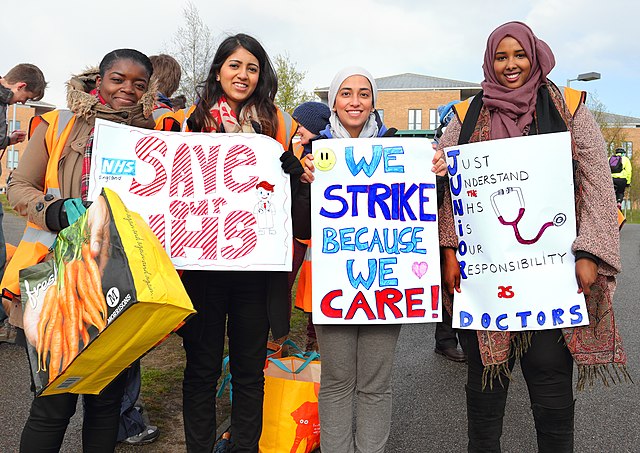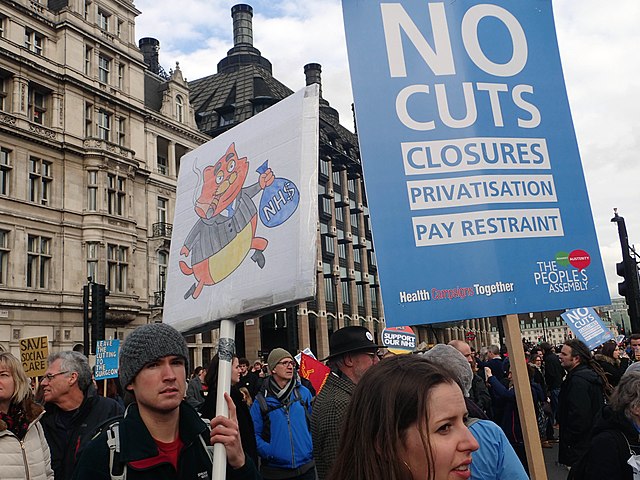Karen Reissmann, psychiatric nurse and active trade-unionist in Manchester, was recently fined £10,000 for organising a small protest rally against the meagre government pay offer of 1% – here she talks to David Paenson
Thank you Karen for giving up your time for this interview. My first question: could you tell us a little about yourself and your work?
I began training as a psychiatric nurse in January 1982 and have been working as such ever since. I was elected shop steward within six weeks and I was on my first strike within three months. There were quite a few to follow.
Can you recount any?
In 1988 we had big demonstrations and strikes against Margaret Thatcher’s policy of reducing taxes by 2% whilst cutting the health service. Our strike struck a chord with the general population. Which is why Thatcher finally offered a revised grading system. But this involved everyone applying individually. That was extremely divisive.
Our rulers always seem to have a trick up their sleeves …
Indeed. Our next big dispute was in 2005–2006 against cuts in the community mental health teams. We struck for some 70 or 80 days over a period of six months. Because of my role in these strikes I was made redundant and blacklisted. But we did manage to suspend the cuts for a further nine years.
Blacklists for nurses?
We took them to court over that and I was eventually given compensation out of court, but I didn’t get my job back.
The irony is that I am now working again for my old boss, since the trust that employed me merged with my original trust. The health service in the UK is national, but it is divided up into countless trusts and outsourced units, which are perpetually involved in mutual takeovers and mergers.
Could your £10,000 fine have something to do with you being on a blacklist?
No. The reason behind the heavy fine is the government and the Home Office’s plans for their Police, Crime, Sentencing and Courts Bill.
In future all protests will need police permission. And even one-man protests and protests that are deemed too loud could be forbidden.
Similar plans over here in Germany. Can you tell us how the pandemic is used to whip up racism?
The government is ramping up its attacks on migrants. So we still have thousands of qualified doctors and nurses who are asylum seekers who, in the middle of a pandemic, are made to sit at home and not permitted to use their skills and talents to save lives.
93 percent of all doctors who died of COVID in the UK were BAME (Black, Asian or Minority Ethnic), and 73 percent of the nurses.
How is the lockdown managed?
In a very racist way. A disproportionate number of black people, poor people too, are fined for breaking regulations, most often in situations where they pose no health threat to others.
But not a single employer has been fined for forcing their employees back to work, telling them “Now, don’t tell anybody you got COVID, just come in and do your work, you seem alright to me”.
That’s awful! How do you explain this mean offer of a 1% pay rise?
The government has become complacent. After the right turn of the Labour Party under Starmer, Johnson and his finance minister Rishi Sunak think they can get away with anything.
Also the trade union leaders are by and large passive and doing their best to avoid any strikes.
And how did you organize your rally of 40 nurses?
It was at very short notice. Their pay offer wasn’t even announced, it was hidden in a little bit of the budget, in the hope that nobody would notice.
And then the explosion of anger was unseen. I would ring people up and before I could even tell them, “Hello, it’s Karen”, I would get “Can you believe what they’ve done!?!”
So we organized a small rally with 40 people attending on a Sunday. All very safe with masks on and two meters apart in the centre of a very deserted Manchester.
So why did the police intervene?
They said that our rally wasn’t lawful. The fact that it was absolutely safe didn’t interest them.
They even threatened to report me to my employer and the Nursing and Midwifery Council to make sure I got struck off the register, and would not be able work as a nurse any more, if I didn’t shut down the rally immediately. So I did.
Then they took me aside and gave me my £10,000 fixed penalty notice. They even wanted to force me into the police van, so that the press wouldn’t be witness to this. A female colleague of mine, who had been standing next to me, got carted off in handcuffs.
Within two hours the £10,000 fine was collected through fund raising. How can you explain that?
The willingness to donate shows the broad solidarity with health workers that exists, but also the anger at the government policies.
One of the government ministers said: “You should be grateful for 1%, some people are getting nothing!” That’s the extent of their arrogance.
But how come the anger on the streets?
A young woman living in London was found dead. Her suspected murderer is a serving police officer, now sitting in prison.
Women tried to organize a protest around this, but the police forbade it. And the court wasn’t helpful either, it just said that the protestors needed to come to an agreement with the police.
In the end the people came to the protest anyway. Thousands of women brought candles, posters and megaphones and started giving speeches. And the police attacked them with batons, literally laid into them, threw them to the ground and pressed their knees into their backs.
Unbelievable!
But again we know that the Home Office is directing the police to do these things. These are political decisions because they want to stamp down on all opposition.
But in a way it backfired on them. The government had to put on a show of being shocked at TV images of police brutality. This illustrates how despite the bravado and the arrogance they put on show, underneath it all they’re actually quite weak
If we did mobilize forces we could stop them with the pay freeze, with their cuts in services, with their incompetent handling of the pandemic.
How can you organize a strike without it hurting patients?
When we went on strike in Manchester it wasn’t easy for us, because we’ve built up a relationship with our patients, their family and friends.
But we tell management: “You know, you are 72 senior managers who are all health qualified, you can come and do our jobs.” It was quite amusing to see how one manager was quite upset at having to go without her carefully painted fingernails on the one day.
But you see, they’ve closed down 17,000 beds over the last ten years, there are 100,000 unfilled vacancies in the NHS: that’s 100,000 people on permanent strike. But no-one blames them for being on strike, a strike ordained by the government!
What do you think of the demand to nationalize the whole of the health care service, including the production of medicines?
I think that’s absolutely right. The market and profit have no place in a health service.
In order to make money, manufacturers prefer to produce a drug that they know people are going to be taking for the rest of their lives, like for arthritis. An anti-biotic that you’ll need for only a few days in order to get rid of an infection is much less profitable. And again, making vaccines for hundreds of millions is extremely profitable.
They also like to market drugs for psychological distress, the causes of which lie elsewhere. Anti-depressants are big money.
What about patents?
We need to produce medicines for people the world over. If COVID-19 and other diseases are not fought globally we will never overcome this pandemic. New mutants will continually crop up and the enormous amounts we spent on developing vaccines will simply go down the drain.
Vast sums of money are continually being wasted. It is estimated that over 20% of the funding for the British health service goes entirely towards the mechanisms of the market: paying people to write contracts, to sit on panels, to sort out the billing within different bits of the health service…
What does the future have in store for us?
There is a broad willingness to strike and to protest.
The left need to organize on the ground. We can’t leave it to left-wing trade union leaders who more often than not are held back by the more right-wing trade union leaders. So we need more independent networking.
Thank you Karen for this wonderful interview!



